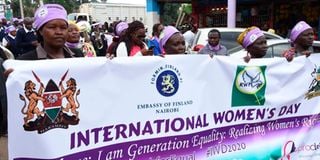Breaking: Autopsy reveals how Cyrus Jirongo died
Njeri Rugene: Thumbs-up to Narok as county leaders protect girls from vices

This year’s International Women’s Day, to be observed on Monday, comes at a precarious time when the shadow of Covid-19 still hovers over us.
In four days, the world will focus its attention on the women as the international community seeks to stand together and, with one voice, celebrate the progress and achievements of the female gender.
Notably, this year’s International Women’s Day, to be observed on Monday, comes at a precarious time when the shadow of Covid-19 still hovers over us — as if turning our lives inside-out and upside-down is not enough. This important day also finds us striving to undo the havoc and devastation the pandemic has caused over the past year.
The effects of the deadly coronavirus have particularly been nasty on women, impacting the lives of millions while magnifying the unrelenting gender imbalance and inequity.
The worst of these effects is the deplorable and perturbing sexual and gender-based violence (SGBV) and violence against women (VAW) that struck many countries globally, mainly during lockdowns, as nations moved to contain the virus. The horrifying violence — which also profoundly inflicted girls — therefore became the ‘shadow pandemic’.
Covid-19
With indications that Covid-19 will be around for quite some time, it is imperative that we commit, in word and deed, to fiercely fight it without giving excuses or reasons for its continued existence and manifestation.
The pandemic has fiercely challenged and tested us. But this is not the time to sit back and look for scapegoats over failure to deal with the SGBV and VAW monsters that coronavirus dragged along. It is time to be vigilant, even as the international community gets busy seeking a cure for the virus.
The campaign theme for this year’s IWD — “A challenged world is an alert world” — is apt, timely and suitable. The world must remain alert to deal with the challenge of all forms of VAW — a fundamental and lethal weapon — and perpetuation of bias, discrimination and inequalities that women face all the time on account of gender. Consequently, we must live up to the second part of the IWD global theme, “Achieving an Equal Future in a Covid-19 world”, as we get down to the fete.
Problematic practices
In the meantime, it is important that measures the government and stakeholders are taking to keep girls in school are recognised and appreciated. Teenage pregnancies, injurious and retrogressive practices such as female genital mutilation/cut and child marriages are some of the ills that have conspired to keep our girls out of school.
In Narok County, which statistics show is one of the regions most severely affected by the problematic practices, the leadership has shown a collective will to deal with the situation. At the peak of Covid-19 last August, leaders who included Governor Samuel Tunai and the clergy convened in a meeting that sought a permanent solution to the problem. The governor indicated then that about 5,000 minors had been reported pregnant in four months. He promised that his administration would do all it could to ensure that situation was reversed for girls to be in school.
Determined to act decisively and end the sorry state of affairs, various leaders from Narok, led by the Maa Women Network Chairperson Angeline Siparo, who also chairs the National Aids Control Council (NACC), Planning Principal Secretary Saitoti Torome and others, supported by Governor Tunai, are set to launch a strategy to end teenage pregnancy in the county.
Taking the bull by the horns
This joint effort by the national and county leadership in Narok tells of a determination to take the bull by the horns and tackle the touchy issue of teenage pregnancy so as to protect and keep girls in school. The other 46 counties need to follow suit.
It behoves the media and related interest groups to also be in the frontline to create awareness of the rights of girls and ensure that they — indeed all children — are in school. And in this, Journalists for Human Rights (JHR), through its Voices for Women and Girls Rights (VWGRs) programme, stands out for its advocacy on the rights of girls and women, and in amplifying the same through empowerment and training of journalists.
Ms Rugene is a consulting editor and founder, The Woman’s Newsroom Foundation. @nrugene





